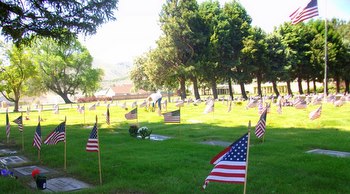-
(单词翻译:双击或拖选)

图片1
Beginners.
Memorial Day is a United States federal holiday that is observed on the last Monday of May. It is to remember all the soldiers that have died in the various wars around the world, even the Civil War which started in 1861 and ended in 1865. The tradition started in this country because of the Civil War, and was expanded after the First World War. Normally, people visit cemeteries1 and put flowers on the graves of loved ones, even those who weren't soldiers. The graves of soldiers are decorated with flags. It has become a tradition at 3pm local time, that a formal service of remembrance takes place. The President of the U.S will usually visit a famous cemetery2 and make a speech, and then all across the country, there will be similar services performed by officials of the local government. Though the official day for observing Memorial Day was May 30th, it has become a tradition of celebrating it early and making it into a three-day weekend holiday. Many people plan a short vacation get-a-way. The roads become very busy with families picnicking, travelling to different towns, and also flying to other destinations.
Related vocabulary: to observe, to expand, remembrance, cemetery, get-a-way.
Exs:
It is a tradition to observe that special day. We usually get together with friends and family for a barbecue.
Her waist has expanded quite a bit because she eats too many desserts.
Remembrance Day reminds us of the great sacrifices that some have made for us.
It was such a dark, windy night, that the couple didn't realize that they had stumbled3 into a creepy cemetery.
I need a get-a-way. Where can we fly cheaply just a few days?
Advanced.
Seeing a cemetery filled with flags fluttering4 in the wind is quite a sight. It makes you stop and think. And that, of course, is the point to the day, to stop and think. In England we celebrate Poppy Day which has the same reason as Memorial Day. Poppy Day, however, is observed on 11th of November, as that is the day that the First World War came to an end. Other countries such as Canada and New Zealand also use poppies to observe this day. But why poppies? The reason we use poppies is because a soldier of the First World War, John McCrae, who was a canadian, wrote a poem called In Flanders Fields. Flanders fields were full of poppies, and so, that flower, being a meaningful blood red color, became adopted as the memorial flower. McCrae wrote the poem after witnessing his best friend die in the trenches5. He actually threw the poem away, but another soldier found the paper and sent in to a London-based newspaper called Punch. The rest is history. Here in the U.S, the flag is the most well known symbol for Memorial Day because of the reunification of the United States after the civil war. It is very patriotic6, but the sentiment7 behind the symbol is just as strong as the blood colored poppy.
 收听单词发音
收听单词发音
1
cemeteries

|
|
| n.(非教堂的)墓地,公墓( cemetery的名词复数 ) | |
参考例句: |
|
|
|
2
cemetery

|
|
| n.坟墓,墓地,坟场 | |
参考例句: |
|
|
|
3
stumbled

|
|
| v.(不顺畅地)说( stumble的过去式和过去分词 );跌跌撞撞地走;绊脚;(说话、演奏等)出错 | |
参考例句: |
|
|
|
4
fluttering

|
|
| v.飘动( flutter的现在分词 );(心)快速跳动;振翼,拍翅膀 | |
参考例句: |
|
|
|
5
trenches

|
|
| 深沟,地沟( trench的名词复数 ); 战壕 | |
参考例句: |
|
|
|
6
patriotic

|
|
| adj.爱国的,有爱国心的 | |
参考例句: |
|
|
|
7
sentiment

|
|
| n.感情,情趣,意见,观点,多愁善感 | |
参考例句: |
|
|
|

















